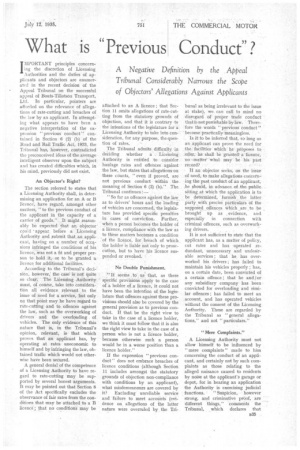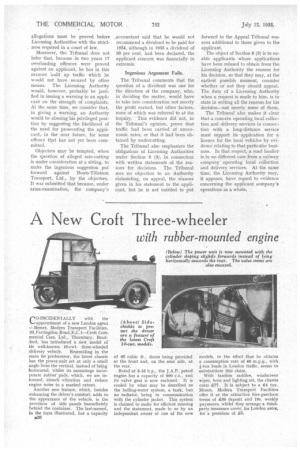What is "Previous Conduct" ?
Page 49

Page 50

If you've noticed an error in this article please click here to report it so we can fix it.
A Negative Definition by the Appeal Tribunal Considerably Narrows the Scope of Objectors' Allegations Against Applicants IMPORTANT principles concerning the discretion of Licensing Authorities and the duties of applicants and objectors are enumerated in the recent decision of the Appeal Tribunal on the successful appeal of Bouts-Tillotson Transport, Ltd. In particular, pointers are afforded on the relevance of allegations of rate-cutting and breaches of the law by an applicant. In attempting what appears to have been a negative interpretation of the expression " previous conduct" contained in Section 6 (2) (b) of the Road and Rail Traffic Act, 1933, the Tribunal has, however, contradicted the preconceived ideas of the average intelligent observer upon the subject and has created difficulties which, in his mind, previously did not exist.
An Objector's Right?
The section referred to states that a Licensing Authority shall, in determining an application for an A or B licence; have regard, amongst other matters, "to the previous conduct of the applicant in the capacity of a• carrier of goods." It might reasonably be expected that an objector could '• appear before a Licensing Authority and aubmit that an appli. cant, having on a number of occasions infringed the conditions of his licence, was not a fit and proper person to hold it,or to be 'granted a• licence for additional facilities.
According to the Tribunal's decision, however,' the case is not quite so clea.r. The LiCensing Authority must, of cotuae, take into consideratiOn all evidence relevant to the issue of need for a service, but only on that point may he have regard to rate-cutting and to offences against the law, such as the overworking of drivers and the overloading . of vehicles. The only evidence of this nature that is, in the Tribunal's opinion, relevant, is that which proves that an applicant has, by operating at rates uneconomic to himself and by infringing the law, obtained traffic which would not otherwise have been secured.
A general denial of the competence of a Licensing Authority to have regard to rate-cutting may be supported by several honest arguments. It may be pointed out that Section 8 of the Act specifically excludes the observance of fair rates from the conditions that may be attached to a B licence ; that no conditions may be
attached to an A licence ; that Section 11 omits allegations of rate-cutting from the statutory grounds of objection, and that it is contrary to the intentions of the legislature for a• .Licensing Authority to take into consideration, for any purpose, the ques
tion of rates. - The Tribunal admits difficulty in deriding whether a Licensing Authority is entitled •to consider haulage rates and offences against the law, but states that allegations on these counts, "even if proved, are not previous conduct within the meaning of Section 6 (2) (b)." The Tribunal continues:— " So far as offences against the law as to drivers' hours and the loading of vehicles are concerned, the legisla ture has provided specific penalties in cases of conviction. Further, when a person becomes the holder of a licence, compliance with the law as to these matters bectimes a condition of the licence, for breach of which, the holder is liable not only to prosecution, but to have his licence sus pended or revoked. • , .
No Double Punishment.
It seems to us that as these specific provisinns apply to the case of a holder of a• licence, it could not have been the intention of the legislature that offences against these provisions should also be covered by the general provision as to previous conduct. If that be the right view to take in the case of a licence holder, we think it must follow that it is also the right view to take in the case of a person who is not a licence holder, because otherwise such a person would be in a worse position than a licence holder."
If the expression "previous conduct'! does not embrace breaches of licence conditions (although Section 11 includes amongst the statutory grounds of objection non-compliance with conditions by an applicant), what misdemeanours are covered by it? Excluding unreliable service and failure to meet accounts (evidence on allegations of the latter nature were overruled by the Tri
bunal as being irrelevant to the issue at stake), we. can call to mind no disregard of proper trade conduct that is not punishable by law. Therefore the words" previous Conduct"
become practically meaningless. ' _ Is it to be inferred that, so long as an applicant can prove the need for the • facilities which he proposes to .offer, he shall be granted a licence, no . matter what iraay be his past
record?
If an objector seeks, on the issue of need, to make allegations concerning the past conduct of an applicant, he should, in advance, of the_ public. sitting at which the application is to be determined, furnish the latter " party with precise particulars of the supposed offences which are ,to be . brought up as evidence, and especially in connection with criminal offences, such as overwork ing drivers. ,
It is not sufficient to state that the applicant has, as a matter of policy, cut rates and has operated redundant, unnecessary and undesirable services ; that he has overworked his drivers ; has failed to maintain his vehicles properly ; has, on a certain date, been convicted of a certain offence ; that he and/or any subsidiary company has been convicted for overloading and similar offences ; has failed to meet an account, and has operated vehicles without the consent of the Licensing Authority. These are regarded by the Tribunal as "general allegations," and not "particulars."
"Mere Complaints."
A Licensing Authority must not allow himself to be influenced by "mere complaints" made to him concerning the conduct of an applicant, and certainly not by such complaints as those relating to the alleged nuisance caused to residents by noise at the applicant's garage or depot, for in hearing an application the Authority is exercising judicial functions. Suspicion, however strong, and criminative proof, are different things," comments the Tribunal, which declares that allegations must be proved before Licensing Authorities with the strict., ness required in a court of law.
Moreover, the Tribunal does not infer that, because in two years 17 overloading offences were proved against an applicant, he has in this manner built up traffic which he would not have secured by other means. The Licensing Authority would, however, probably be justified in issuing a warning to an applicant on the strength of complaints. At the same time, we consider that, in giving a warning, an Authority would be abusing his privileged position by suggesting the likelihood of the need for prosecuting the applicant,. in the near future, for some offence that has not yet been committed.
Objectors may be tempted, when the question of alleged rate-cutting is under consideration at a sitting, to make the ingenious suggestion put forward against Bouts-Tillotson Transport, Ltd., by the objectors. It was submitted that because, under cross-examination, the company's accountant said that he would not recommend a dividend to be paid for 1934, although in 1933 a dividend of 30 per cent, had been declared, the applicant concern was financially in extremes.
Ingenious Argument Fails.
The Tribunal comments that the question of a dividend was one for the directors of the company, who, in deciding the matter, would have to take into consideration not merely the profit earned, but other factors, none of which was referred to at the inquiry. This evidence did not, in the Tribunal's opinion, prove that traffic had been carried at uneconomic rates, or that it had been obtained by undercutting.
The Tribunal also emphasizes the obligations of Licensing Authorities under Section 6 (3), in connection with written statements of the reasons for decisions. The Tribunal sees no objection to an Authority elaborating, on appeal, the reasons given in his statement to the applicant, but he is not entitled to put forward to the Appeal Tribunal reasons additional to those given to the applicant.
The object of Section 6 (3) is to enable applicants whose applications have been refused to obtain from' the Licensing Authority the reasons for his decision, so that they may, at the earliest possible moment, consider whether or not they should appeal. The duty of a Licensing Authority when a request is made to him, is to state in writing all the reasons for his decision—not merely some of them.
The Tribunal also makes it clear that a concern operating local collection and delivery services in connection with a long-distance service must support its application for a licence for the local vehicles by evidence' relating to that particular business. In that respect, a road haulier is in no different case from a railway company operating local collection and delivery services. At the same time, the Licensing Authority may, it appears, have regard to evidence concerning the applicant company's operations as a whole.




























































































